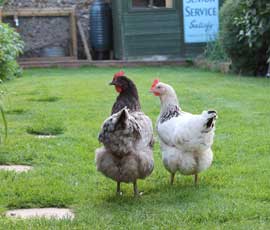Backyard chickens pose threat to poultry farmers

Research by the Royal Veterinary College has revealed that backyard chicken-keepers have a lack of disease knowledge and insufficient awareness of laws, which could have implications on disease control and animal welfare.
In particular, there was a low level of awareness among those surveyed in the Greater London area about diseases like Marek’s disease, infectious laryngotracheitis and Infectious bronchitis, which have all been diagnosed in backyard flocks and could negatively affect birds’ welfare.
The research also found disease prevention measures such as vaccination are rare in backyard flocks.
And, while the chickens were generally provided with good living conditions, about three-quarters of those surveyed did not comply with DEFRA regulations on the feeding of kitchen waste.
It has been illegal to feed such waste to farmed animals in the UK since 2001, because some disease agents can survive in food products and facilitate the spread of disease.
The research also found lapses in biosecurity – limiting the access of human visitors, wild birds and rodents to the flocks were rare. Furthermore, nearly half of the flock owners would not seek veterinary help in cases of illness in their chickens.
And about 40% stated they would dispose of dead birds by burying them in their gardens, when in fact they should be incinerated to prevent disease spread through groundwater and wild species.
Poultry vet Barry Thorp from St David’s Poultry Team in Scotland said the rise in people keeping backyard chickens increased the possibility of disease spreading into the commercial sector.
“Because they are farm livestock, they require a different approach to pet animals. It’s not necessarily that they’re badly treated, but a lack of education and awareness by those who buy them certainly make them more vulnerable to disease and therefore pose a bigger threat of spreading it,” he said.
Report author Iveta Karabozhilova said the study showed the need for improved communication between the authorities and chicken keepers, as well as better knowledge from those choosing to keep chickens.
